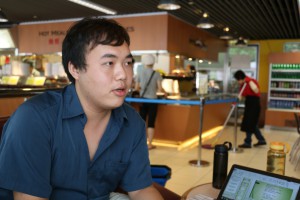Sung Ka-wing, a final-year student at Chinese University, is also passionate about launching his own start-up. He got one step closer to his goal when he won third prize in the 2015 China Youth Internet Venture Competition for an idea to start a network for innovative tech start-ups.

However, his family strongly opposed his plan to start his own business. He feels immense pressure to find a well-paid and stable job after graduation and support the family.
Sung has no choice but to compromise. He has sent out job applications to a number of investment banks and plans to “work for his family” if his start-up does not turn a profit before he graduates in May next year.
Family pressure has also taken its toll on Olivia Tam Oi-kwan, now 35, who has worked as both part-timer and freelancer on and off for nearly 10 years. She has sacrificed a more stable and perhaps higher income in exchange for a life she desires.
Tam recalls that when she was preparing for the Hong Kong Advanced Level Examinations, she came across a required reading about the meaning of life. It became a reason for her to embrace non-regular employment.
She says her income from working as a freelancer or a part-timer can support her simple life, which she is satisfied with. However, as Tam was approaching her thirties, her mother was still worried about her having enough money to live on. This was hard on Tam who further stresses that she cannot afford to give her mother any allowance. Although she has an elder brother and sister, their incomes are only sufficient to support their own children.
Describing herself as a traditional person, Tam found her mother’s love and anxieties as well as the responsibility she felt about supporting her mother became an emotional burden. She eventually chose to compromise and gave up her ideal way of life. She has now found a full-time job.
While some young people may enjoy following alternative employment patterns, Alicia Leung Shuk-mei, associate professor at the School of Business at the Hong Kong Baptist University, says there are positive aspects about traditional workplaces.
Leung believes a physical office can serve as a binding force for employees, and a setting for people to brainstorm ideas. “People can discuss while eating, or when even using the bathroom.” She notes that companies like Google are working hard to improve the work environment. In this way, employees may find the office much more like home and possibly work longer.
A common workspace and regular employment contracts can give workers the collective strength to bargain for better pay and conditions. No matter how the nature of work has changed, Mung Siu-tat, chief executive of Hong Kong Confederation of Trade Unions, points out that “you are still a worker”.
Mung says that unfortunately some freelancers do not perceive themselves as workers and do not consider the need to join trade unions. They believe they are distinguished from other workers because of their autonomy and freedom.
In contrast, Working Today, an American non-profit advocating the rights of independent workers, founded the Freelancers’ Union in 2003. The union works to bring benefits to freelancers such as providing health insurance plans for its 275,000 members.
As for young people who choose the start-up route, Mung says Hong Kong business and industries are highly concentrated and start-ups could be thrown into “a sea of sharks”. He says that only when the government can facilitate a more humane working environment as a whole, would young people have a real choice of work. In the meantime, no matter how much the world changes, he believes “power comes from organising.”
Edited by Benny Kung










































